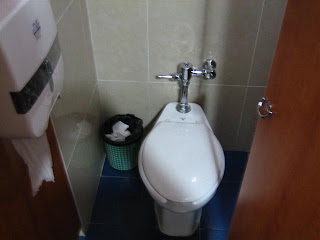Here's the question:
I live about twenty minutes east of Wonju and am having a few issues with shoes. It's not the size, but the style. Out here we only have shoes that my grandfather stopped wearing thirty years ago. I know a trip in Seoul would do the trick, but what can I expect to find?
A trip into Seoul (Myeong-dong, Gangnam, Itaewon, Apgujeong, COEX) would certainly give you some more styles and since your feet aren't freakishly large, it'd just be a matter of finding the pair(s) you like. I've had two (male) friends in Korea that spent most of their money on shoes. I'm not talking about formal shoes either. They spent thousands on sneakers. One of them actually posted his pictures on Facebook. That's weird as hell, but it's a least testament to the variety you can find.*
That variety can be a blessing and a curse. I recently saw a pair of
Wallabees
being sold in COEX which certainly
gave me a flashback took me back to my high school days of attempting to re-live
Dazed and Confused
. It was honestly a little surprising since the hippie meme is a relatively uncommon sight in Korea. While I don't sport the look anymore, that would have been quite a blessing over a decade ago. The curse, however, is the resurgence of high-tops. Christ, they're ugly. I blame 2NE1...and Zach Morris.
Over the past couple years, I've seen Korean shoe fashion get progressively worse. To understand the shoes, you've gotta look at the rest of the threads.
Korean men pretty much have three looks aside from school uniforms.
1.The College Student (19-26 yrs old)
The college student is the most aesthetically diverse of the group. Just like their female classmates, male college students are dying to express themselves through fashion or hair. Some dye their locks while others attempt a shaved G-Dragon-esque doo. Some get in touch with their hip-hop roots and go for the urban look. There's nothing that says "I'm hard" like showing your colors on the mean streets of Gangnam. The most recent trend are the skinny jeans. Man, I hate skinny jeans. Since when was looking like a sissy a good look for men? Luckily, most college students dress pretty down-to-earth.
2. The Businessman (26-55)
The businessmen range from clip-on ties to really classy shit. For the most part, they like the dark, slightly-feminine leather shoes which, of course, compliment the shiny suits.
3. The Ahjussi (55+)
Depending on retirement age, the ahjussi look is a mixture of 70's upholstery and over-priced outdoor gear.
All of them are unique from the other, yet every man must experience each style before moving on to the next. Women, on the other hand, are much more complex than men, so I'll just mention a few complaints.
Boots are huge for Korean women. Some of them are nice and others are pretty hideous. The UGG's that I hated seeing in the early aughts in college have been taking over Korea for the past couple years. I've gotten used to those at this point. There's also been a swing away from the skort to the skirt, but that changes so often that I'm not sure.
You see, I'm a Gangnam guy. I've always lived in Gangnam. I work on the main drag and live one street off of that drag. I'm bombarded with Gangnam fashion. It has its ups and downs. I get to see see mostly classy fashion all the time and that's okay, but I never get to see the "hipster" college scene that takes place in Hongdae. I also don't stay out late, so the late-night party scene is lost on me at this point. I'm usually pretty surprised when I see a woman dressed even slightly different than the other thousands on the streets.
If you want fashion, head over to Feetmanseoul.com. Hurt's got his shit together.
Bottom line is that once in Seoul, you'll have more than enough options for shoes.
*I've heard some expats complain about shoe sizes on here and I'm sure there are places you can find big shoes, but that's not the question.


















